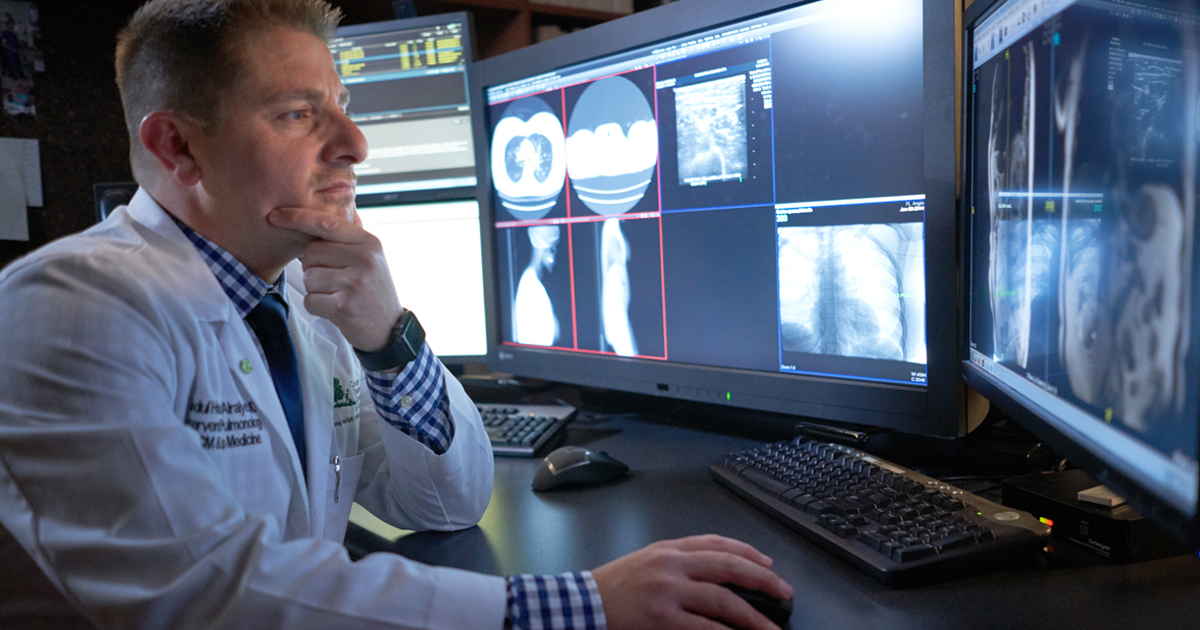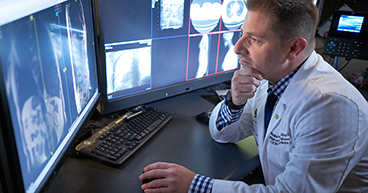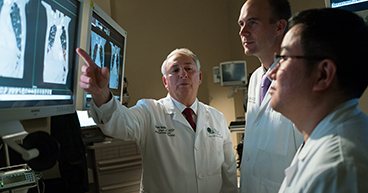
Kendal Hervert, DO, FCCP, is a Pulmonologist at our Tulsa hospital who completed an internal medicine residency, followed by a pulmonary medicine fellowship, at Oklahoma State University Medical Center in Tulsa. Tapping learnings from her work, training and research, she shares these seven things she thinks everyone should know about lung cancer:
“We’ve seen some exciting advancements in diagnosing and managing lung cancer over the past few years.”
Lung cancer remains the leading cause of cancer-related death for men and women in America. One of the challenges in diagnosing lung cancer has been the ability to reach lesions deep in the lung in a minimally invasive manner. We are thrilled to be one of the first hospitals in the country to be using robotic bronchoscopy to better localize peripheral lung lesions for biopsy. This may reduce the need for surgical lung biopsy or needle biopsy through the chest wall.
“A new screening has been developed to catch lung cancer in early stages.”
I have the honor of being a board member for the American Lung Association of Oklahoma, and one of the initiatives close to my heart is the Saved By The Scan campaign. This new lung cancer screening can save your life.
“Smoking remains the leading cause of lung cancer.”
Men who smoke are 23 times more likely to develop lung cancer, and women are 13 times more likely than women who never smoked, according to the American Lung Association. In addition, a study by the National Lung Screening Trial Research Team found that lung cancer screening in high-risk patients (adults age 55-80 years old, with a 30-pack/year smoking history, who smoke or quit smoking within the last 15 years) has been shown to decrease mortality from lung cancer by 20 percent. I encourage all smokers to talk to their doctor about lung cancer screening and resources to help you to quit smoking. It’s never too late to quit, even if it takes trying over and over again.
“Our growing knowledge of the genetic drivers of cancer has also led to new targeted treatments that often can be better tolerated than traditional chemotherapy.”
Cancer is a result of abnormal genes that cause uncontrolled growth of cells. There are many different genes in many different types of cells in our body, and not all cancers are a result of one bad gene. In some cases, when a specific genetic mutation is identified, certain medication may be used to turn off the abnormal growth signal and stop growth of cancer.
“We have also added immunotherapy to our cancer-fighting toolbox.”
This is due to the work of James P. Allison and Tasuku Honjo, who are 2018 Nobel Prize recipients. Immunotherapy is delivered by infusion into the bloodstream, helping T-cells in the immune system recognize cancer cells that previously had the ability to hide from destruction. Once the cancer cells are recognized, the immune system can attack them.
“Please don’t believe everything you read on the internet.” Not all supplements, even those labeled “natural,” are safe to use. Some can be harmful when combined with cancer treatments. You’ll also find published data on the survival rate for lung cancer. Keep in mind that these numbers are based on population averages, and they are not a predictor for how long an individual diagnosed with lung cancer will live.
“Every patient is unique, and his or her experience with cancer is different.” The stories of cures that worked for one person may not have the same outcome for the next. That is why countless scientists, doctors and researchers have dedicated their lives to studying how to beat this disease.
Learn why this oncologist thinks lung cancer should be screened like colon and breast cancer.


